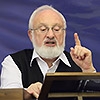Educational Program Of Terminology
 All of our life, history, and everything that we went through from the beginning of creation until now divides into two parts: exile and redemption. There is nothing else except for these two states:
All of our life, history, and everything that we went through from the beginning of creation until now divides into two parts: exile and redemption. There is nothing else except for these two states:
- It could be that I separate from the upper force and exist in exile, in some kind of illusion, in a “dream” that is called “this world” under the influence of my egoistic desire which detaches me from seeing and feeling the spiritual world;
- Or by means of certain actions, which the wisdom of Kabbalah teaches us, I reach the revelation of the upper force and demand it to take me out of exile, and to raise me above this world to the upper world, and when that finally happens, then I am rewarded with redemption.
The difference between exile (Galut – גלות) and redemption (Geula – גאולה) is the letter “Aleph” (א), which symbolizes the Creator, (Aluph – אלוף) Champion of the world. This is how all of our reality is divided, all the process of development. We certainly aren’t aware of this until suddenly we receive an awakening which allows us to stop the period of exile, the darkness, the feeling of this world, the intolerable and worst state, and to pass to a new period, a new level, a new state, that is called redemption. It’s for this that we study.
Since we exist in this world, we use the words to describe the upper world, the spiritual state. But together with this, it’s forbidden to forget that the contents and meanings of the words are different from their usual meanings. For example, Adam (man/human) belongs to the category of “Israel,” which isn’t according to one’s birth, but according to his spiritual longings.
“Religious,” from the spiritual meaning of the wisdom of Kabbalah, are the Sefirot of “Daat” (intellect/knowledge), “Tifferet” (Splendor) and “Yesod” (Foundation) which is the middle line. In other words, a person who already works with three lines and arrives, or at least longs to adhere to the Creator is called “religious.” And secular is one who is found under the control of the desire to receive. “Holiness” is the attribute of bestowal and love.
In this way, all our terms and definitions are characteristic of only one thing: identifying what force operates on a person in determining his intention in each action. Either it’s with the intention for the sake of bestowal, according to the principle of “love your friend as yourself,” which comes to “love of the Creator,” or the opposite, with the intention to receive for oneself. That is all the difference that exists between people.
A person who studies the wisdom of Kabbalah without the intention to attract the Light that Reforms has no chance to attract this Light in any other way. And without this Light he remains “secular,” meaning he exists with the intention to receive for himself. He is separated from the Creator and even from the Light that Reforms, which is also called the “Torah.” Thus, when we are reading the writings of the Kabbalists, we need to always understand and remember that they express solely spiritual terms.
[94589]
From the 4th part the Daily Kabbalah Lesson 12/3/12, “Exile and Redemption”
Related Material:
The Correct Attitude Toward Sacred Books
Kabbalah: One Simple System Of The Basic Laws Of Nature
TES: A Kabbalist’s Personal Diary







Discussion | Share Feedback | Ask a question